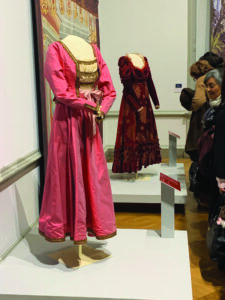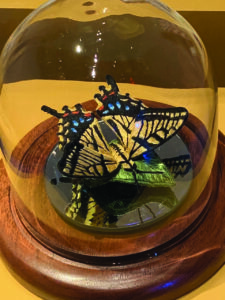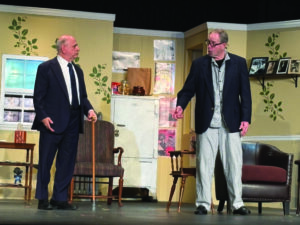
The Capitol Hill-based theatre company We Happy Few is currently presenting Karel Čapek’s groundbreaking play “R.U.R.” Produced by Artistic Director Kerry McGee, the show was initially presented live, but the production was obliged to close early due to unforeseen circumstances. Fortunately, the troupe follows the theatrical dictum “the show must go on:” it is continuing to present its unique version of the 1920 play via streaming the recorded performance.
“R.U.R.” stands for “Rossum’s Universal Robots.” The play is famous for introducing the word “robot” to the world! (Čapek credited his brother for actually coining the word, which comes from Czech words related to forced labor and slavery.) The plot revolves around Domin, who, while dictating a letter to his robot secretary Sulla (played by a stoic Emilia Pazniokas), is visited by Helena Glory, daughter of the president of the unspecified country in which the plot takes place.
Helena is not only the privileged daughter of the president but is also an idealist who represents the Humanitarian League, which is concerned that the robots being produced by R.U.R. do not have rights and that their dignity is not respected. Domin and his managers counter this with a utilitarian “greater good” argument, maintaining that robot labor will cause lower prices, eliminate poverty, and free humans to fulfill their own mission of “perfecting themselves.”
Helena reminds one in name and in beauty of the classical Helen of Troy, but her role is more like the Trojan princess Cassandra: she has the foresight to warn of future troubles but is also cursed in that no one listens to her. As the robots begin to revolt, does hope remain for humanity?
With our society’s current focus on technological innovation and artificial intelligence, such a play naturally raises many relevant ethical questions. The robots in both the original productions of the play, and also in We Happy Few’s presentation, are not clanky metal machines, but are humanoid as well as biological in nature and sometimes in behavior. Should they be treated humanely and not as machines? Should they, as Helena proposes, be allowed to have human appetites, human feelings, and perhaps even souls? Also, what of the humans themselves? If freed from the demands of work, what will they do with their limitless leisure time…perfect themselves, or instead themselves become as mindless as their robot creations?
We already see in Act One of the play that Domin and his managers have themselves become a bit like robots, with Domin coldly proposing marriage to Helena while looking at his watch as he awaits his robot-prepared lunch. In fact, the play has great resonance for us today for raising the question very present in today’s world as to what work the labor force will find when displaced by AI and other forms of automation. Later, when a character talks about his ability to grow plants quickly, we are reminded of doubts about the wisdom of tampering with nature, a concern many have raised with genetic modification of plants, animals, and even humans today.
“R.U.R.” is an example of retro futurism, that is, how people in the past viewed the future. In the costumes worn by the actors and actresses, traditional early twentieth-century fashions (designed by Lee Gerstenhaber) prevail, such as the long dresses and covered-up appearances of Sulla and Helena. This choice complements the staging, which presents a metallic and mechanized vision of technological progress driving the creation of the future. Props such as a dial phone, a vintage typewriter, a world globe, a ship model, and a slanted mantlepiece are mixed in with abstract and Expressionist set pieces. These have been executed by director Matt Reckeweg to represent the clash between modern development in technology (including robots) with traditional views of humanity.
The acting, too, is both modern and “retro.” Both robots and humans behave in a very theatrical, stylized fashion. Made Key, who plays Helena, gestures in a way reminiscent of silent films of the 1920’s “R.U.R” era, and Matthew Sparacino, as the Edwardian suit-wearing Domin, employs a clipped way of speaking that cleverly serves to place the audience in a past age while also suggesting his overly utilitarian robot-infused humanity. The acting of the robot characters such as Scott Whalen as Radius (the especially intelligent robot assigned to a library to absorb the world’s knowledge) similarly fuses machine-like and human qualities.
We Happy Few’s thoughtful production of “R.U.R.” will continue to stream through Thanksgiving. Readers interested in this fascinating and increasingly relevant play with its ethical concerns for our times may view the production by visiting: wehappyfewdc.com/











